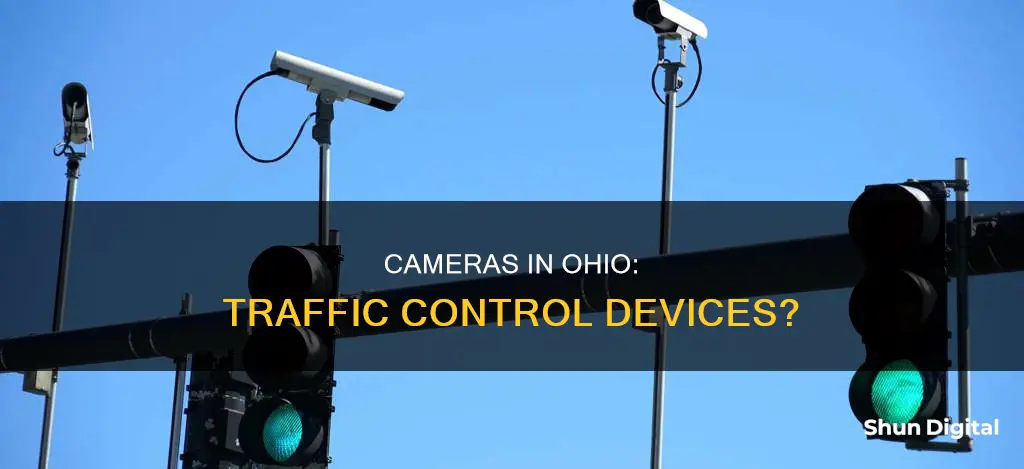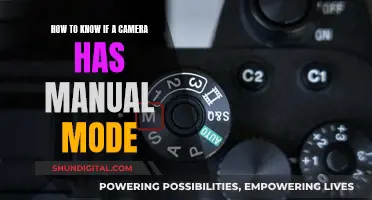
Traffic cameras are legal in Ohio, but there are several laws and stipulations surrounding their usage. According to the Ohio Revised Code, local authorities can use traffic law photo-monitoring devices, or traffic cameras, to detect and enforce traffic law violations. However, a law enforcement officer must be present while the device is being used, and there must be signs posted to notify the public of the presence of these devices.
| Characteristics | Values |
|---|---|
| Are cameras a traffic control device in Ohio? | No, cameras are not a traffic control device in Ohio. A "traffic control device" is defined under Ohio Revised Code Section 4511.01(Q)(Q) as a flagger, sign, signal, marking or other device used to regulate, warn or guide traffic. |
| Are traffic cameras legal in Ohio? | Yes, traffic cameras are legal in Ohio. Local authorities can use traffic law photo-monitoring devices, or traffic cameras, to detect and enforce traffic law violations. |
| Stipulations | A law enforcement officer must be present at the location of the device during its operation. There must be signs posted that the devices are there. |
| Tickets | Tickets are sent in the mail within 30 days of the violation to the registered owner of the vehicle. |
| Fines | Fines range from $150 to $250 depending on the number of miles per hour over the speed limit. |
| Late fees | Tickets paid after 30 days but before 45 days will include a $25 late fee. Tickets paid after 45 days will include an $80 late fee. |
What You'll Learn

Are traffic cameras legal in Ohio?
The use of traffic cameras in Ohio has been a contentious issue for some time, with state lawmakers and local governments battling over their legality. While traffic cameras have been deemed legal in Ohio, there are several stipulations in place that govern their use.
In 2004, Ohio passed a law permitting cities to install red-light and speed cameras to issue tickets to drivers violating traffic laws. However, the legality of these cameras is not solely based on state law but also on individual city ordinances and court rulings. While Ohio law allows traffic cameras, it does not mandate their use, and each city can establish its own guidelines and procedures. Some cities in Ohio, such as Garfield Heights, have chosen to remove traffic cameras due to the high costs of operating and enforcing them.
According to the Ohio Revised Code, local authorities, including municipal corporations, counties, or townships, can employ traffic law photo-monitoring devices or traffic cameras to detect and enforce traffic law violations. However, a critical condition outlined in Section 4511.093 of the Ohio Revised Code is that a law enforcement officer must be present at the location of the device during its operation. Additionally, there must be posted signs informing the public of the presence of these devices.
The Ohio Supreme Court has weighed in on the matter multiple times, upholding the legality of traffic cameras in several rulings. In 2022, the court unanimously upheld a law that allows the state to reduce funding to municipalities that use traffic enforcement cameras by the amount collected from traffic camera tickets. This decision addressed the long-standing dispute between state lawmakers and local officials over the use of these cameras.
Despite the legal challenges and restrictions, several cities in Ohio continue to utilise red-light and speed cameras. As of 2021, about 344 US communities were using red-light camera programs, according to the Insurance Institute of Highway Safety (IIHS). In Ohio, over 20 cities rely on camera tickets to enforce traffic rules, and these tickets are enforceable and carry consequences for non-payment.
Car Dealership Surveillance: Cameras and Your Privacy
You may want to see also

What are the penalties for disobeying a traffic control device?
In Ohio, traffic cameras are legal and enforceable. They are used to detect and enforce traffic law violations, but only if a law enforcement officer is present while the device is being used. There must also be signs posted to inform drivers of the presence of these devices.
If you receive a ticket from a traffic camera, it is best to address it. Ignoring a ticket may result in an increased fine, a negative impact on your driving record, and even a court summons, which will cost additional fees in legal fees and time.
- Pay the citation and accept liability: This option waives your ability to contest the ticket.
- Provide an affidavit: Within 30 days of receiving the ticket, you can submit an affidavit stating that another person was operating your vehicle at the time of the violation or that your vehicle or license plate was stolen.
- Contest the ticket: You can contest the camera ticket by filing a written request. You may be able to avoid the ticket if it was not issued correctly or if there were issues with the camera or speed limit signs.
Failing to respond to a camera ticket or appear in court can lead to serious consequences, including:
- Fine Increase: If you do not pay the ticket on time, the fine will typically increase.
- Driving Record Impact: Your driving record may be negatively affected, which could lead to higher insurance premiums upon renewal.
- Court Summons: In some cases, ignoring a ticket may result in a court summons, requiring you to incur legal fees and spend time resolving the issue.
- License Suspension: Failure to address the ticket or appear in court can result in the suspension of your driver's license. This means you won't be able to renew your license or register a new vehicle until you've paid the fines and associated fees.
It's important to note that the penalties for disobeying a traffic control device, such as a traffic camera, can vary depending on the specific circumstances and your previous driving record. It's always advisable to seek legal advice or consult with a traffic ticket attorney to understand your options and the potential consequences fully.
Surveillance Cameras in Cars: Legal or Not?
You may want to see also

Do camera tickets go on your record?
In Ohio, camera tickets are considered civil violations or civil penalties under state law and do not go on your driving record. This is specified in Section 4511.098 of the Ohio Revised Code. However, ignoring a camera ticket can result in increased fines and negative consequences for your driving record. For example, failure to respond to a camera ticket or appear in court can lead to a driver's license suspension, impacting your ability to renew your license or register a new vehicle.
In other states, such as Iowa, camera tickets are also typically treated as civil infractions that do not go on your driving record. While they may not affect your insurance rates or driving record, failing to pay these tickets can result in civil penalties and collection efforts by the city or local government.
Outdoor Game Motion Cameras: How Long Do Batteries Really Last?
You may want to see also

What are the benefits of traffic cameras?
Traffic cameras are an increasingly common feature of roads in the US and worldwide. While their legality varies from state to state, and they are the subject of some controversy, they do offer several benefits.
Improved Traffic Flow
Mobile surveillance cameras can be placed at common congestion points to provide information on the causes of poor traffic flow. Cameras with built-in 4G LTE transmission technology allow users to view live and recorded footage remotely and share this information with road users via traffic warning signs.
Enhanced Data Gathering
State transportation departments can use mobile surveillance cameras to monitor traffic flow and gather data on peak times and accident hotspots. This information can then be used to inform future road development and construction work.
Crime Prevention
Traffic cameras are most commonly used for crime prevention and investigation. They can be placed at known hotspots for traffic violations or deployed along highways to prevent illegal dumping. They can also be used to monitor and enforce compliance with local or national vehicle noise limits.
Encourage Safe Driving
The presence of visible surveillance cameras at intersections and along highways can help to encourage safe driving habits and discourage moving violations.
Protect Workers and Equipment
Deploying a mobile surveillance unit to monitor a temporary road construction site can help protect workers and guard valuable materials and tools from theft.
How to Get Your Camera to Show as a Drive Letter
You may want to see also

What are the drawbacks of traffic cameras?
Traffic cameras are an increasingly common feature on roads in Ohio and across the United States. While some people argue that they improve road safety, there are several drawbacks to their use.
One of the main concerns surrounding traffic cameras is the invasion of privacy and violation of citizens' rights. Traffic cameras can photograph people without their knowledge, which goes against the right to face one's accuser. This also raises concerns about the potential for abuse and the use of data for purposes beyond tracking reckless drivers. For example, in Ohio, traffic camera tickets are civil violations that do not appear on driving records, but there is still the potential for misuse of data.
Another drawback of traffic cameras is their potential to cause errors and result in incorrect ticketing. This can occur due to poor maintenance, low-quality images, or the inability to identify the driver of a vehicle. In the case of red-light cameras, there is also evidence to suggest that they can increase the number of rear-end collisions as drivers stop suddenly to avoid a ticket.
The effectiveness of traffic cameras in improving road safety is also questionable. While some argue that they act as a deterrent, data from the Federal Highway Administration suggests that the impact of automated enforcement systems is inconsistent and inconclusive. Additionally, there is the concern that local governments use traffic cameras as a way to generate revenue rather than to protect drivers.
Overall, while traffic cameras can provide valuable evidence and peace of mind for drivers, there are also several drawbacks to their use, including privacy concerns, potential errors, and questionable effectiveness.
Fighting a NY Speeding Ticket: What You Need to Know
You may want to see also
Frequently asked questions
No, cameras are not considered "traffic control devices" in Ohio. A "traffic control device" is defined as a flagger, sign, signal, marking or other device used to regulate, warn or guide traffic. A camera is not included in this definition.
Yes, traffic cameras are legal in Ohio, but there are some stipulations. Local authorities must post signs notifying the public about the presence of traffic cameras, and a law enforcement officer must be present while the camera is in use.
Yes, you can receive a ticket from a traffic camera in Ohio. These tickets are typically considered civil violations and result in financial penalties. However, if you ignore a ticket, the fine will increase, and your driving record may be negatively affected.







